This was the year when movies went virtual, completely bypassing theaters because of the worldwide pandemic lockdowns. Though Hollywood big-budget blockbusters and new franchise installments largely stayed away from streaming—until Wonder Woman 1984 hits HBO Max on Christmas Day—indies dominated the release schedule, living up to the show business adage that the show must go on.
For art-house filmgoers there was an upside; no matter where they lived in North America, they could view an acclaimed title that would have otherwise screened in a handful of theatres in Los Angeles or New York pre-Covid 19. (More often than not, the streaming fee is significantly cheaper than a night at the multiplex.)
In many ways, 2020 was the year of the indies; they were often the only game in town. However, this year has been so unusual that I would be cautious in predicting long-term trends yet. When discussing the last 12 months, 2020 will always come with an asterisk.
Based on my experience as the director programming at the Monmouth Film Festival, many films suddenly were not available after the first week of March, with distributors’ and filmmakers’ plans up in the air throughout the next nine months as everyone scrambled, figuring out what to do. Many films are still waiting it out, sitting on a shelf until the pandemic is over, whenever that will be. Yet several prominent distributors (Neon, Kino Lorber, Magnolia) kept to a release schedule.
As a result, there were plenty of films to choose from for a top 10 list. In fact, rewatching many of the contenders, it came as a relief to see that they had held up over the passage of time. The following titles were selected from input from seven reviewers, with a view toward a variety of filmmaking styles, genres, and an international focus. Obviously, the events of the pandemic and its ongoing aftereffects have had more than a little impact on shaping the selections.
Because of the new release patterns during the pandemic, all are currently available on demand or on a streaming platform (which usually offer a free trial period, hint, hint), with the exception of one movie scheduled for release in February. Kent Turner
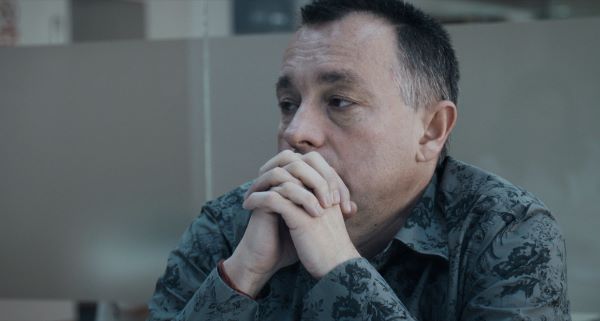
Collective
In any given year, this Romanian documentary would be hailed as among the best for the importance of its subject and the skillful way it reports a horrific event and its aftermath. A fatal fire in the nightclub Collectiv (27 dead, 180 injured) revealed the lack of a proper safety inspection system nationwide, and the tragedy morphed into an endless nightmare when dozens of the injured later died in hospitals from bacterial infections.
When the press aggressively investigates the story, they find out that those deaths are related to diluted disinfectants. Who’s responsible? In different degrees of knowledge and complicity, everyone: drug companies, the heads of hospitals, doctors. The specificity of the investigation connects with global concerns wherever corruption triumphs, governments deceive, and the press is demonized. Regarding the latter, the film advocates that the media should never stop asking questions so as to hold the bearers of power accountable.
As directed by Alexander Nanau, this film is as unsettling as any horror movie released this year and an essential and necessary snapshot for our troubled times, especially in a post-Covid-19 world. (Video on demand on various platforms) Guillermo López Meza
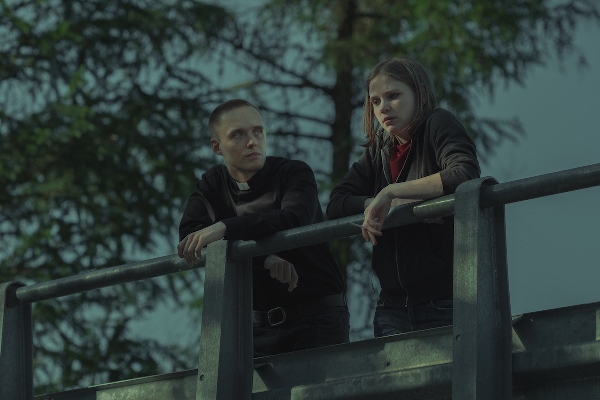
Corpus Christi
Most movies about criminal characters impersonating a high-class profession often come with a cynical or scheming edge, but director Jan Komasa’s drama pleasantly bucks that trope. The desire of Daniel (Bartosz Bielenia), a juvenile delinquent, to become a priest inadvertently comes true after he poses as one in a small Polish town and ends up taking over the local vicar’s duties. The unfolding story feels unique and nuanced in how it juxtaposes lies against earnestness. Daniel might be a fraud, but he genuinely embraces the responsibilities of priesthood and offers his flock a heartfelt outlook on faith and forgiveness, even if it requires keeping his criminal history under wraps.
Corpus Christi’s symbolism is explicit but well crafted, as Daniel eventually takes it upon himself to disavow the town’s biases against the driver of a car killed in an accident along with six others. Save for a few sequences, this is a thriller without physical action, building tension through words and dueling philosophies rather than fists. How much of this untraditional religious approach succeeds is ultimately left to the viewer’s interpretation. Released back in February, the Polish film was nominated for the Best International Feature Film Academy Award earlier this year. (Film Movement Plus and various platforms) Ben Wasserman

Disclosure
Director Sam Feder’s engaging and conversational documentary reflects on the wide-ranging depictions of transgender persons throughout film and television history while offering an often maligned community a long-awaited chance to clap back. The commentators, all trans creatives and intellectuals, address the lazy, at times dangerous, stereotyping long employed by Hollywood—think Norman Bates in Psycho or Buffalo Bill in The Silence of the Lambs.
Most of the interviewees share the trauma from the negative representations they all grew up with, and there is no shortage of archived clips that by today’s standards come across as outdated, if not downright offensive. Yet, some of the best moments dissect recent media intended to bring trans issues into the mainstream, but are all too clumsy at it.
While it reveals grievances and shines a light on the harsh conditions faced by everyday transgender persons, Disclosure has an overall tone that is lively and cautiously optimistic. The overview is one of several excellent documentaries released this year (including another Netflix-distributed title, Crip Camp) in which those who were long marginalized speak of their own experiences. (Netflix) Phil Guie

Emma
Director Autumn de Wilde’s debut feature adds sparkle and spunk to any list. She directs with the slightest of hand Eleanor Catton’s adaptation of Jane Austin’s 1815 novel on the marital machinations of the vain, venal, and vacuous in bucolic Regency England. The film confirms a hoary-but-true saying: directing is 90 percent casting. De Wilde showcases a rising crop of British actors, including Anya Taylor-Joy in the title role, Johnny Flynn as Mr. Knightley, and subtle scene-stealer Mia Goth as Emma’s pet project, Harriet Smith. Additionally, Austen’s eccentrics provide a goldmine for character actors.
There is rarely a casual moment here. The stakes are high, and the entire ensemble play their roles seriously no matter how absurd the behavior, upping the comedy of manners to a satiric level. With its Easter egg color palette for the palatial interiors, its closest rival in the Austen oeuvre may be MGM’s Pride and Prejudice (1940) for luxurious eye candy. This pungent and poignant remake will be a refreshing revitalizer for those who have given up on pretty period pieces. (Video on demand on various platforms) KT
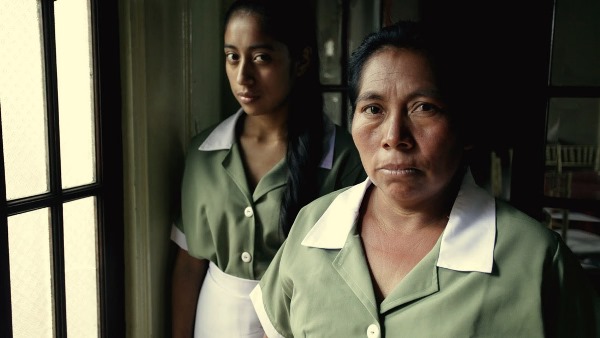
La Llorona
If horror films are, as David Cronenberg says, about confrontation, then La Llorona, directed by Jayro Bustamante, is exemplary. This unsettling slow burn of a horror film is at once a contemporary take on the eponymous Latin American legend and a reckoning with the terrors of colonialism.
Guatemalan General Enrique Monteverde (Julio Diaz) is housebound, his home surrounded by a crowd of protestors because he has controversially been acquitted of genocidal crimes against the Mayan. The horrors of the past, however, will not be suppressed and come to haunt the sickly general in the form of a new maid.
Most of the action is confined to his home and, fascinatingly, seen through the eyes of his wife and adult daughter. We, with them, are forced to deal with the emotions his actions have caused—the layers of denial, the mounting suspicions, the disgust, the ambiguous nature of one’s own complicity. As such, La Llorona is a hard experience to shake. Also, it’s scary. (Streaming on Shudder and Amazon Prime) Andrew Plimpton
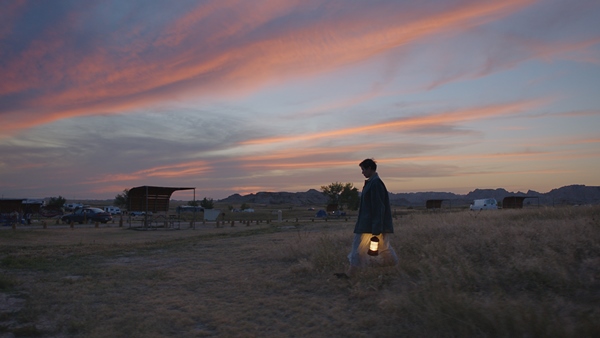
Nomadland
Winner of the Golden Lion at the Venice Film Festival, this contemplative road movie is being tipped as a surefire Oscar contender for its star, Frances McDormand, for her remarkable performance.
Bringing strength and stoicism to her role as Fern, McDormand plays a widow who goes on the road for the life of a free spirit after the shutdown of her Nevada mining town. A van becomes her home as she travels across the country through stunning landscapes of mountain vistas and cactus-filled deserts. Frigid nights and flat tires temper the romantic image of an untethered life, though. She gets by working seasonal gigs like packing Amazon shipments, cleaning toilets at Badlands National Park, or working at a greasy spoon, where she meets Dave (David Strathairn), a fellow drifter who presents her with a more reliable option for the future.
This marks the third feature for Beijing-born, NYU-educated director Chloé Zhao, who uses nonprofessional actors to portray transients and nonconformists. Echoing the unemployment, homelessness, and medical fragility so evident in our pandemic era—especially among older Americans—Nomadland is a perfect fit for this moment. (Scheduled for a theatrical released in February) Rania Richardson
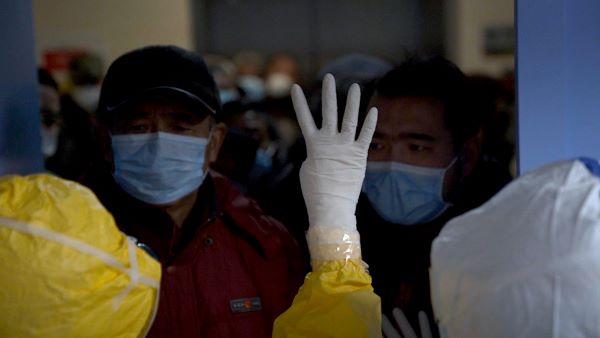
76 Days
A collaboration between directors Hao Wu, Weixi Chen, and an anonymous reporter, the documentary offers a rare look into the coronavirus’s epicenter long before it would dominate every facet of our lives. The film was shot cinema verité style across four hospitals during Wuhan’s 76 day-lockdown from January to early April and eerily captures the “now” of that moment: nonstop exhaustion and bustle from essential workers doing everything possible to treat their patients, even as many die solitary and anticlimactic deaths. Contrasted against these tragedies are the stories of Covid-19 survivors who become part of the hospital’s “family,” from an old man initially frustrated at his mandatory isolation to a couple grappling over their newborn baby’s health.
Through these medical vignettes, 76 Days never stops reminding the viewer of the stakes at play and the resolve of its faculty to tackle the crisis they faced head-on, regardless of the risks. It’s a sharp contrast to the callous indifference and anti-science nature of America’s coronavirus response in virtually every way possible (see Totally Under Control). (Now available in virtual cinemas) BW

Sorry We Missed You
A delivery driver and a health care worker with two school-aged children struggle to make ends meet, but they never catch a break. Sound familiar? The plight of the working class is front and center in our Covid-19 era, but it’s been a major theme in the work of British director Ken Loach since the 1960s. In his latest insightful work, he takes on the myth of making it in the gig economy.
Centered around Newcastle, England, 40-something Ricky (Kris Hitchen) gets a freelance job delivering packages for a company that entices him with catchphrases like “be your own boss” and “control your destiny.” But through 14-hour days, he is tethered to a scanning device that tracks his every move. The misleading promises give way to fines and sanctions as he tries to meet deadlines and maintain family obligations, an impossible task.
His wife, Abbie (Debbie Honeywood), works as a home health aide for individual clients. She radiates a generosity of spirit even while attending to stubborn clients and mopping up excrement, with no compensation for the long hours and extra on-the-job demands. It comes as no surprise that their teenage son rebels against his absentee parents and acts out to distance himself from the bleak future he sees in front of him.
Loach propels the family drama with his usual observant style and exposes of-the-moment issues with levity and compassion. With more than two dozen feature films under his belt, his humanitarian outlook has only gotten sharper with time. (Now streaming on various platforms) RR
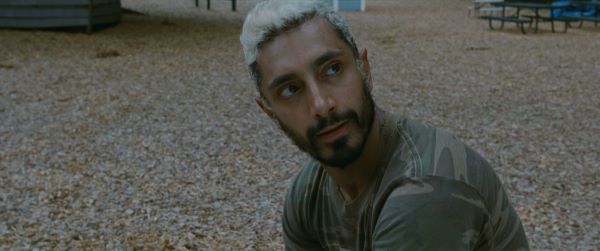
Sound of Metal
The scorching performance of Riz Ahmed as someone facing, rebutting, and reconciling a life-changing transformation makes this film an intense and compelling experience.
In the middle of an onstage performance, drummer Ruben (Ahmed) loses his hearing entirely, and is left with a new reality he has pretended to deny so far. He has lived, worked, and loved through music as a member of a punk band, alongside his girlfriend, Lou (Olivia Cooke), and is now challenged to reconsider deafness as a presumed disability after he joins a community for other deaf recovering addicts, like himself. Regarding whether Ruben should accept this new way of living, there are no clear-cut answers.
The strength of the film, directed by Darius Marder (his first narrative feature), doesn’t end with the central performance: the careful choices in the sound effects transform Ruben’s situation into an immersive journey that made us understand how he hears the world around him.(Amazon Prime) GLM
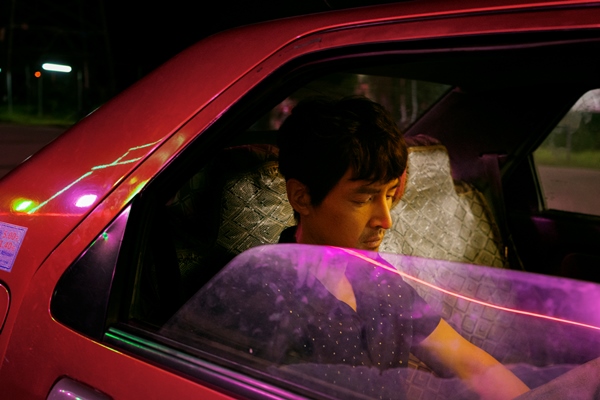
The Wild Goose Lake
Diao Yinan’s neo-noir thriller may feature scenes that unspool during the day, but its essence belongs to the night. The film’s endless visual imagination and dark atmospherics are balanced by a tough it-is-what-it-is fatalism—a sort of emotional withholding that gives a lavishly conceived work even more power.
Lean, enigmatic antihero Zhou Zenong (Hu Ge) receives a message from a nervous young woman, Liu Aiai (Gwei Lun Mei), in an ominous, rain-soaked railroad station. The charged meeting links their fates. He’s a lone wolf on the run from a gangster ring he defied with an act of murder. She’s a “bathing beauty” (“lady of the night” is another name for it) who could help Zhou, but she may also want to nab the hefty bounty on his head.
These two will be embroiled in a game of cat and mouse with local gangsters and crooked cops, a complex chase where it will become clear who is pursuing whom. Flashbacks and twists complicate the plot, but you’re so drawn in it doesn’t matter. Modern China plays a supporting role as a seedy and treacherous backdrop, pulsing with surreal moments and wild splashes of color against the prevailing darkness.
Within this swarming visual landscape, the director knows how to hold back. When an out-of-nowhere decapitation takes place in a no-comment fashion and a sexual transaction goes down like the matter-of-fact swatting of a mosquito, the message seems clear: everything around us teems with malevolent life, but nothing really matters. (Streaming on Film Movement Plus and various platforms) Caroline Ely
















Leave A Comment